| Srl | Item |
| 1 |
ID:
125567


|
|
|
|
|
| Publication |
2013.
|
| Summary/Abstract |
The overthrow of Libyan leader Muammar Ghadaffi in 2011 prompted a flood of weapons into north Africa and the Middle East. Cameron Scott investigates the rise of illicit arms trafficking and its effects on regional stability.
|
|
|
|
|
|
|
|
|
|
|
|
|
|
|
|
| 2 |
ID:
125242


|
|
|
|
|
| Publication |
2013.
|
| Summary/Abstract |
The author has tried to locate the connectivity of ASEAN-India and Myanmar. Myanmar sighted that India is an essential dialogue partner of ASEAN and is playing a crucial role in regional peace and stability. A very important observation is that Myanmar and India's North-Eastern region share similar conditions when compared to ASEAN and mainland India, respectively. For India, Myanmar is strategically important because of its geostrategic location, linking the regions of East Asia, Southeast Asia and South Asia.
|
|
|
|
|
|
|
|
|
|
|
|
|
|
|
|
| 3 |
ID:
131388
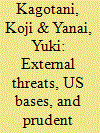

|
|
|
|
|
| Publication |
2014.
|
| Summary/Abstract |
A number of US overseas bases were deployed around the world to protect allies and maintain regional peace. Some bases have been stationed in the partner countries for the long term, whereas others were withdrawn from their partners' territories in the face of strong local opposition. Understanding local support for US overseas bases is indispensable for managing alliance politics and pursuing US grand strategy. This article addresses the 1972-2006 Okinawa gubernatorial elections where the US base issue had been chronically politicized and locals supported pro-base candidates six out of ten times contrary to their anti-base preferences. This article addresses external threats as a determinant of vote choice. We analyze the gubernatorial elections as the opportunities for Okinawans to convey their support for or opposition to the current national security policy since US bases in Okinawa are critical to Japan's security. We find that external threats do encourage Okinawans to support pro-base candidates, but the effect of perceived security-related risks is moderate. Moreover, physical and psychological costs such as airplane crashes, environmental and noise pollution, and rape incidents have larger influence on the election outcomes rather than material benefits such as the fiscal transfers and base-related subsidies, which is contrary to the conventional view.
|
|
|
|
|
|
|
|
|
|
|
|
|
|
|
|
| 4 |
ID:
125372
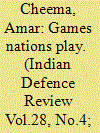

|
|
|
|
|
| Publication |
2013.
|
| Summary/Abstract |
Realpolitik dictates a policy of 'congagement' of China and explains America's reasons for accommodating the former at the grand table. Thus, while the US-Chinese relationship is expected to remain the 'most important,' it is only to the point that the overall balance of power and global primacy remains with USA. Thus, while economics dictates that business can be done as usual, the USA would attempt to limit Chinese power projection capability thereby challenging the status quo in the Asia-Pacific region. The desire to do this by greater and more robust collaboration with established and new allies/partners is the underlying theme of the US re-balancing and is 'pre-emptive' in nature.
|
|
|
|
|
|
|
|
|
|
|
|
|
|
|
|
| 5 |
ID:
133908
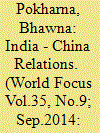

|
|
|
|
|
| Publication |
2014.
|
| Summary/Abstract |
India and China, the two great neighbours jointly account for 15% of geographical land and 35% of total world population. The friendly relations between the two countries are essential for the peace and security in the region and the world as a whole. With the new leadership at the helm in both countries it can be hoped that new beginnings will be made to augment bilateral relations. Indian Prime Minister Narendra Modi has advocated skill, scale and speed to compete with China, simultaneously India is also relying on I2 T2 approach wherein focus will be on two Is investment and infrastructure and two Ts trade and tourism. China too has extended positive signals to forge close ties with India
|
|
|
|
|
|
|
|
|
|
|
|
|
|
|
|
| 6 |
ID:
175985
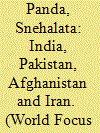

|
|
|
|
|
| Summary/Abstract |
Peace may be an interregnum between two periods of war but the interregnum can be long or short depending on the resources and capabilities of two or more nations. For centuries leaders have used several means appropriate for the time including diplomacy and dialogue to reduce conflict so that “behavioural restraints” could be favourable for prosperity of the people. Despite disagreement on certain issues India has maintained good relationship with Afghanistan and Iran. Opening channels of communication with Pakistan will be best option though it is difficult. “Since wars began in the minds of men, it is in the minds of men that the defences of peace must be constructed”
|
|
|
|
|
|
|
|
|
|
|
|
|
|
|
|
| 7 |
ID:
128390
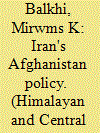

|
|
|
|
|
| Publication |
2011.
|
| Summary/Abstract |
The financial assistance of Iranian authorities to the President of Afghanistan Hamid Karzai in October 2010, has once again sparked the discussion on Iranian policy towards Afghanistan. The fable of "money envelopes" which was delivered by Islamic Republic of Iran by non- diplomatic means remains a hot topic both inside and outside Afghanistan. llamid Karzai confirmed at a press conference that his chief of office receives cash between five to seven hundred thousand Euros: twice each year from Iran. Though the President of Afghanistan clari?ed that this controversial so called financial aid has been part of the' international financial support in which Iran is involved in the post- Taliban reconstruction of Afghanistan, his reply could not convince the- analysts who are experts on Iran and Afghanistan policies. The main reason that the issue became controversial has been theonedia propaganda related to this issue in which Iran is accused of providing military aid and financial support to the Taliban in Afghanistan. The seizure of two thousand oil tankers by Iranian government which resul - _ in a large anti-Iranian demonstration in Kabul against the Iran emba _ highlighted the issue. Few months before, in March 2010, Irani President Mahmud Ahmadinezhad during his visit to Kabul emphas' - y. Iran's disagreement over the presence of NATO in Afghanistan. He sai to regional peace."
|
|
|
|
|
|
|
|
|
|
|
|
|
|
|
|
| 8 |
ID:
130968
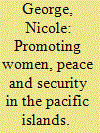

|
|
|
|
|
| Publication |
2014.
|
| Summary/Abstract |
How has the Women, Peace and Security agenda been advanced in the Pacific Islands? While some observers argue that this region suffers from a contagion of unrest, violence and state weakness, these estimates commonly ignore the vital work women have performed in the region as promoters of peace and security. Even when such activity places them in direct personal danger, women across the region have spearheaded efforts to bridge communal boundaries and challenge the increasing normalisation of violence, gendered and otherwise, that accompanies threatened or actual incidents of conflict. As this article demonstrates, these efforts have had profound impacts on the ground in conflict-affected Pacific Island countries. They have also received increased recognition at the level of institutional politics, with member states of the Pacific Islands Forum recently accepting a Regional Action Plan on Women, Peace and Security. This has been hailed as a significant achievement for the region's women peacebuilders. But much of this plan is focused on women's contributions to peacebuilding at the pointy end of a crisis. This overlooks the extent to which the 'slow violence' of environmental degradation, masculinised politics and militarism also compound gendered insecurity in the region. Attention to these issues offers a contradictory picture of the gains made in promoting the Women, Peace and Security agenda in the Pacific Islands. While this advocacy framework has provided important opportunities for the region's women peacebuilders, it may also have discouraged broader reflection on the prevailing structural conditions at work across the region which function in an attenuated fashion to undermine women's security and the achievement of a gendered regional peace.
|
|
|
|
|
|
|
|
|
|
|
|
|
|
|
|